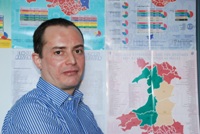Democracy in Contemporary Wales

Professor Roger Scully
24 May 2011
Are the Welsh as politically radical as they like to consider themselves? This will be one of the questions addressed by one of Wales’ leading political analysts on Thursday night.
In his Professorial Inaugural Lecture, Democracy in Contemporary Wales, to be delivered in the home of Aberystwyth University’s world-leading Department of International Politics, Prof Roger Scully will argue the need for the more serious, systematic study of politics in Wales.
He will contend that “political life here is arguably in greater need of sustained, critical attention than in most places. In the absence of a body of serious scholarly analysis, characterisations of politics in Wales have long tended to draw heavily on myths and clichés that have rarely, if ever, been properly investigated.”
Among these myths, Prof Scully will argue, is that of the Welsh ‘radical tradition’. But although the idea that the Welsh are, and have long been, more politically radical than the English is ‘ubiquitous’ in political discourse, Prof Scully will make the case that “evidence for this idea is much weaker and more limited than this discourse suggests”, and thus challenge “a defining feature of the political self-image of Wales”.
In the lecture, Prof Scully will also argue that:
- Growing support for devolution over the last decade in Wales does not indicate the rise of Nationalism in Welsh politics; in contrast to Scotland, an analysis of public attitudes about how Wales should be governed shows the success of ‘unionist devolutionism’.
- While the people of Wales have given greater support to the Welsh level of government in recent years, there are no signs of this producing any growth in the degree or intensity of their identification with Wales. Nor has there been any decline in the strength of British identity among the people of Wales since the onset of devolution.
- The continuing dominance of party politics in Wales by the Labour party has produced a lop-sided, one-party dominant form of democratic politics in Wales that is, in important respects, fundamentally unhealthy.
Prof Roger Scully is originally from Luton in England. He studied at Lancaster and Ohio State Universities, and lectured at Brunel University before joining Aberystwyth in 2000. He is an Academician of the Academy of Social Sciences, and a Fellow of the Learned Society of Wales.
He has been Director of the Institute of Welsh Politics at Aberystwyth University since 2009. In recent years he has also been a regular media commentator on many aspects of politics in Wales.
Among his previously published work is Becoming Europeans? Attitudes, Behaviour and Socialisation in the European Parliament (oxford University Press, 2005) and Representing Europe’s Citizens? Electoral Institutions and the Failure of Parliamentary Representation in Europe (Oxford University Press, 2007; co-authored with David M. Farrell).
He is co-author (with Richard Wyn Jones) of the forthcoming definitive study of the March 2011 Welsh referendum, Wales Says Yes: the 2011 Welsh Referendum (University of Wales Press, 2012).
Prof Scully is also Co-Director of the 2011 Welsh Referendum Study and the 2011 Welsh Election study; both studies have been supported by research grants from the Economic and Social Research Council of the United Kingdom.
The Professorial Inaugural Lectures are a series of lectures given by Professors in the Department of International Politics at Aberystwyth University. Prof Scully’s lecture will draw on his research on Welsh politics over the last decade.
The Lecture is free to attend, and open to anyone who wishes to do so. It will be held in the Main Hall of the International Politics building at Aberystwyth University, at 6pm, on Thursday 26th May.
The Institute of Welsh Politics is an independent and non-partisan research centre within the Department of International Politics at Aberystwyth University. It was established to promote the academic study and analysis of all aspects of Welsh politics. Reflecting its institutional home within the oldest Department of International Relations in the world, the work of the Institute focuses not only on the political process within Wales, but also on Wales' political and political-economic relations within Britain, Europe and the wider world.
AU12311



